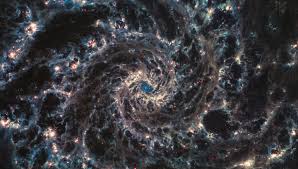A Groundbreaking Revelation
Using the cutting-edge James Webb Space Telescope (JWST), scientists have made a groundbreaking discovery in a protoplanetary disk orbiting a low-mass star. This revelation unveils a diverse array of carbon molecules, hinting at a distinctive planetary formation environment that may give rise to carbon-deficient planets.
Unraveling the Findings
1. Studying Protoplanetary Disks
A Stellar Observation
An international consortium of astronomers leveraged the capabilities of NASA’s JWST to scrutinize the gas and dust enveloping a youthful, low-mass star. The outcome of their inquiry presents the most extensive inventory of carbon-containing molecules ever detected within such a disk. These revelations carry profound implications for the potential characteristics of planets evolving in proximity to this celestial body.
2. Implications for Planetary Evolution
The Quest for Understanding
Rocky planets are more apt to emerge around low-mass stars, marking them as the prevalent planetary archetype in our galaxy. Nevertheless, the chemical composition of these worlds remains largely enigmatic. By scrutinizing the protoplanetary disks from which they emerge, astronomers aspire to gain deeper insights into the planetary genesis process and the eventual constitution of these cosmic entities.
Navigating Challenges in Cosmic Exploration
1. Addressing Technical Hurdles
A Formidable Endeavor
The study of planet-forming disks encircling very low-mass stars poses significant challenges, given their diminutive size and subdued luminosity compared to their high-mass counterparts. The MIRI Mid-Infrared Disk Survey (MINDS) initiative endeavors to harness the unique capabilities of JWST to bridge the knowledge gap between disk chemistry and exoplanet attributes.
2. Leveraging Technological Innovations
Unlocking New Frontiers
The JWST boasts superior sensitivity and spectral resolution, surpassing its predecessors in infrared space exploration. These advancements enable astronomers to delve deeper into the cosmic tapestry, shedding light on phenomena previously beyond our purview due to atmospheric interference.
Pioneering Discoveries in Cosmic Chemistry
As humanity embarks on a voyage of cosmic exploration, each discovery propels us closer to unraveling the mysteries of the universe. The revelation of carbon-rich environments within protoplanetary disks signifies a paradigm shift in our understanding of planetary formation processes and the cosmic ingredients that shape our celestial neighborhood.




